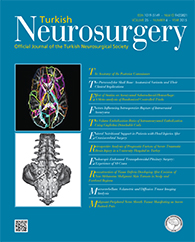2Changyuan County People’s Hospital in Henan Province, Department of Neurosurgery, Xinxiang, China DOI : 10.5137/1019-5149.JTN.9503-13.1 AIM: To explore the effect of early enteral (EN) and parenteral nutritional (PN) support on head-injured patients after craniocerebral surgery.
MATERIAL and METHODS: We randomly divided 120 head trauma patients into two groups: those receiving EN and those receiving PN support (60 patients each). Physiological and biochemical indices, monitoring time and cost, and the incidence of complications were compared between the two groups.
RESULTS: More patients presented with complications in the PN than the EN group, and this difference was statistically significant (P <0.05). One week after surgery, albumin (ALB), alanine aminotransferase (ALT), and blood glucose (GLU) levels were 39.6 ± 3.3 U/L, 51.4 ± 5.6 U/L, and 9.6 ± 5.2 mmol/L, respectively, in the EN group, and monitoring time and cost were 4.0 ± 1.2 days and 1.2 ± 1.0 thousand yuan, respectively. In the PN group, ALB, ALT, and GLU levels were 34.3 ± 3.4 U/L, 65.5 ± 6.1 U/L, and 15.1 ± 4.0 mmol/L, respectively, and monitoring time and cost were 6.2 ± 1.5 days and 1.8 ± 2.0 thousand yuan, respectively. We detected significant differences between the two groups (P <0.05).
CONCLUSION: Early EN support is superior to PN support in head-injured patients after craniocerebral surgery.
Keywords : Craniocerebral surgery, Enteral nutrition, Parenteral nutrition




